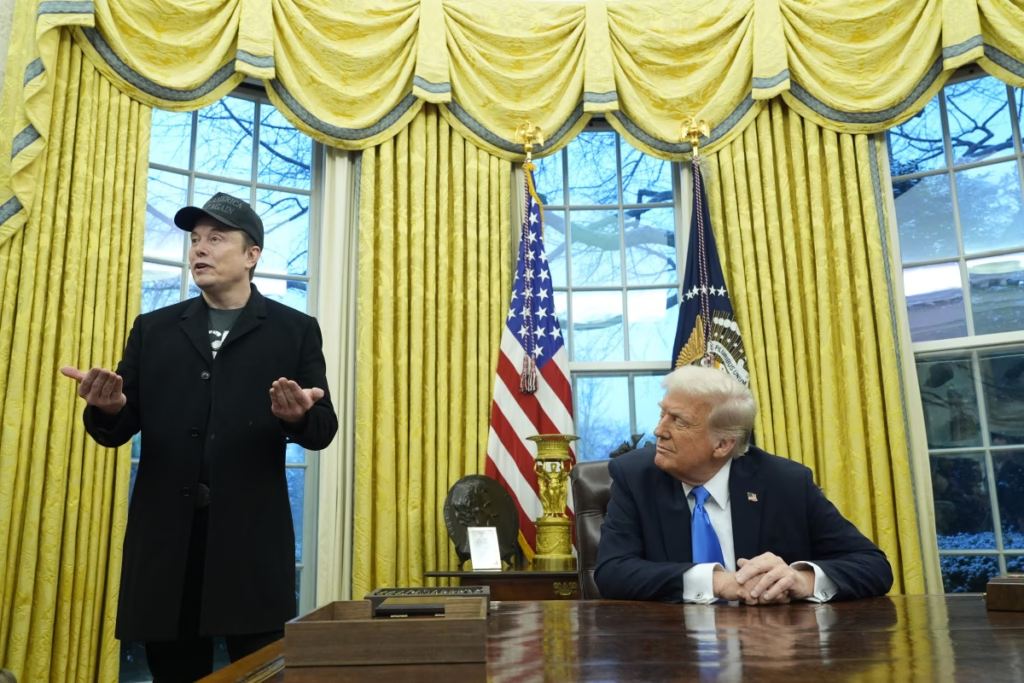Why Elon Musk Is Now the Target of Major Lawsuits Over His Role in Government?

Elon Musk, the ultra-wealthy CEO of Tesla, SpaceX, and X, has always made headlines for his ambitious projects, but his latest venture has placed him at the center of some serious legal battles. Elon Musk has become a central figure in an initiative created under former President Donald Trump’s administration called the U.S. DOGE Service (Department of Government Efficiency). However, this initiative is raising serious constitutional questions about the concentration of power in Musk’s hands, especially considering his position has not been formally approved by the Senate, unlike traditional government officials.
What Is the DOGE Service?
The DOGE initiative was created through an executive order by Trump to overhaul and modernize government systems. However, the issue lies in the fact that DOGE is not a formally established government department. Musk, who leads this initiative, has been operating in a role that’s unclear, unregulated, and with significant power over federal systems, all without proper congressional vetting.
This ambiguity has drawn legal challenges. Critics argue that Elon Musk’s influence within the government is unconstitutional, as the Constitution requires powerful federal officers to be appointed and confirmed by the Senate. Musk, not being confirmed, is facing lawsuits that claim his actions are undermining the traditional checks and balances that keep power within the hands of accountable public servants.
Legal Action Against Musk: What Are the Lawsuits Saying?
Two new lawsuits, one brought by state governments and another by federal employees, have targeted Musk personally. They accuse him of wielding too much power and controlling government databases and systems without any proper oversight. The plaintiffs argue that Elon Musk’s role allows him to freeze funds, access sensitive data, and even dismantle entire federal agencies without facing the usual checks on his actions.

The legal challengers point to Elon Musk’s power to control these sensitive operations, which are traditionally managed by elected officials or Senate-confirmed figures, as evidence of his overreach. This has caused significant concern about the risks of his involvement in sensitive governmental operations and the implications of such unchecked power.
Court Response and Ongoing Developments
U.S. District Judge Tanya Chutkan presided over the case filed by the states and acknowledged that there are legitimate concerns about Elon Musk’s access to government systems. However, she stopped short of issuing an immediate restraining order to halt his activities, saying that more concrete evidence would be needed before taking such drastic action. Despite this, it’s clear that Musk’s role in government, as leader of an unconfirmed entity, is creating chaos and confusion among both federal employees and state officials.
One lawsuit lawyer noted, “We’re playing Whac-A-Mole here,” highlighting the unpredictable nature of Musk’s involvement in various federal agencies.
elon Musk’s Role: A Controversial CEO in Government
Elon Musk’s influence in Washington has been shrouded in mystery, with no clear explanation of his official duties. He is not only engaged in efforts to reshape government agencies but also frequently interacts with the White House and has been involved in high-level discussions with Trump. Musk’s role, unlike that of any other CEO in history, is unprecedented and is drawing comparisons to cases like that of special counsel Jack Smith’s involvement in Trump’s Mar-a-Lago investigation. Some view Musk’s unchecked role as a modern-day equivalent of this controversial situation.
A Constitutional Debate
At the heart of this legal battle lies the Constitution’s “appointments clause,” which requires most federal officers to be confirmed by the Senate. If Musk’s position is upheld, it could set a dangerous precedent for the future and raise questions about how much power the president can hand over to private individuals, especially CEOs with significant resources and influence.
The fight over Musk’s role in government is far from over, and as these cases move through the courts, the issue could potentially reach the Supreme Court. How far Musk can go without proper approval from Congress will ultimately shape future debates about the separation of powers and the proper boundaries between the public and private sectors in government.

Conclusion
Elon Musk’s involvement in the DOGE Service is not just about his tech ventures anymore; it’s becoming a major constitutional issue. With legal challenges mounting against him and his unconfirmed position, Musk’s role in the U.S. government could have lasting implications for the power and influence of private individuals within the public sector. The outcome of this ongoing legal battle may set new precedents in the relationship between private business and government operations.






